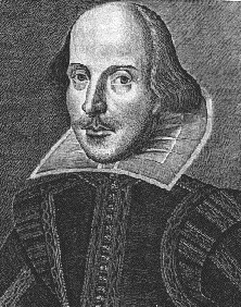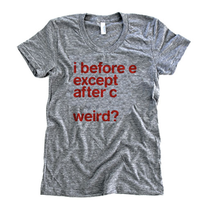|
4/23/2012 1 Comment Observing #TalkLikeShakespeare Day We recalled this morning, upon perusing our Twitter feed, that today is the day we remember William Shakespeare's influence on our language -- Shakespeare having been born, and died, on or about April 23rd. ==================================== Manual of Style @ChicagoManual 'Tis #TalkLikeShakespeare Day! Partake in the celebration with Gary Logan's The Eloquent Shakespeare: http://bit.ly/J4Qijz ==================================== So, for your enjoyment and edification:
Thou talkest (modern: you talk) You talk He/She/It talketh (modern: he/she/it talks) They talk Note how few changes have been wrought in our pronouns and verb forms by four hundred years' evolution!
1 Comment
 'I' before 'E' except after 'C' ~ Weird! That's rather it in a nutshell. English is a peculiar language of rules and exceptions and exceptions-to-the-exceptions. Ours is a language that's adopted words from more directions (and other languages) than can be counted, and we've no Ultimate Authority that acts to control the result. It's enchanting and confounding. We at Write and Polish enjoy it for it's very madness, but understand that it makes many want to throw their hands in the air in despair! |
Write and Polish BloggersChristie Manussier, principal Writer and Polisher, is the usual news reporter. CategoriesAll Abbreviation Academic Acronym Adjective Adverb Anachronism Anagram Apostrophe Application Article Banished Biography Blend B.N.I. Boldface Brochure Bunnies Business Business Plan Capitalization Children's Literature Christmas Church Comma Common Mistakes Construction Contact Management Content Contest Cross-sell Databse Differentiators Donation Double Negative E-mail Entertainment Etymology Event Coordination File Format First Reference Flyer Fundraiser Giggles Gold Star Grammar Day Grant Proposal Haiku Health Care Homophones Hyphen Idiom Images Italics Law Firm Magazine Manual Marketing Maternity Leave Metaphor Myth News & Announcements Newsletter Non Profit Non-profit Noun Numbers Of Snakes And Presidents Parts Of Speech P.D.F. Plural Poetry Portmanteau Poster Powerpoint P.R. Preposition Press Release Projects Pronoun Proofreading & Editing Punctuation Quotation Marks Quotes Real Estate Recommended Reading Reflexive Research Resources Restaurant Retail R.F.P. R.I.P. Shakespeare Slideshow Social Media Spelling Style Manual Synonyms Syntax Template Tenses Testimonial Thesaurus Training Manual Translation Travel Twitter Underlining Verb Video Vocabulary Website Why The World Needs More Proofreaders Winter Word Of The Day Writers Writing Tip Archives
March 2015
|
Search by typing & pressing enter

 RSS Feed
RSS Feed